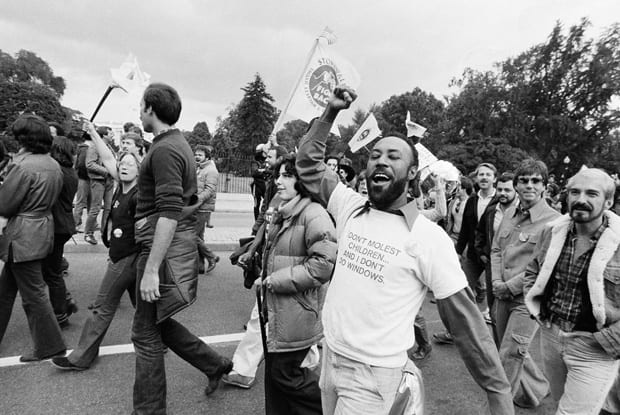We’ve been through so much and the struggle continues. But we can’t forget to truly celebrate ourselves and our community

MARCH ON WASHINGTON | Participants in a march sponsored by the National Gay Task Force file past the White House in Washington, Oct. 14, 1979. (Dennis Cook/Associated Press)
 I didn’t sleep much that night. The sounds of my three roommates snoring and having sex kept me awake — well, that and the excitement of the event we were about to attend made sleeping an optional activity. Such is youth.
I didn’t sleep much that night. The sounds of my three roommates snoring and having sex kept me awake — well, that and the excitement of the event we were about to attend made sleeping an optional activity. Such is youth.
Later that morning I joined several hundred fellow Texans and several hundred thousand other Americans as we marched through the streets of Washington to the National Mall where the 1979 March on Washington held its rally to demand lesbian and gay rights.
We were still working on just who we were as a people and “LGBT” had yet to become the moniker. We had put lesbian first out of deference to the “male privilege” that we had only recently come to understand.
This was only 10 years after the Stonewall Riots and the movement was still defining itself.
I was reminded of this momentous occasion recently when I received a gift from a friend. It was a copy of the program for the march, and it brought back a flood of memories, both good and bad.
As I read through the pages of the program, I realized that not only had our movement grown and matured, we had still failed to produce the results that first march demanded.
As I read them I realized how few had actually come to pass. They seem like perfectly reasonable requests. They are simple and straightforward and, frankly, if met would solve most of the problems still facing us today, 35 years later:
• Pass a comprehensive lesbian/gay rights bill in Congress.
• Issue a presidential executive order banning discrimination based on sexual orientation in the federal government, the military, and federally contracted private employment.
• Repeal all anti-lesbian/gay laws.
• End discrimination in lesbian-mother and gay-father custody cases.
• Protect lesbian and gay youth from any laws which are used to discriminate, oppress, and/or harass them in their homes, schools, jobs and social environments.
Depending on the state in which you live, some of these may already be moot. But here in Texas, that is not the case.
The organizers of that 1979 march realized that a state-by-state reform would only delay true equality and the incremental victories would only reinforce the inequality.
If things were going to really change, they knew back then, that change had to be at the federal level.
With the exception of adding “bisexual and transgender” to the “lesbian/gay” wording, this list of needs should still be our goal today. Instead, we are squabbling over same-sex marriage as though it would solve everything. It won’t. Though there are legal protections and privileges that marriage grants, it is not full and equal protection under the law.
The other part of the program that really affected me was the closing paragraph:
“Today in the Capital of America, we are all here, the almost liberated and the slightly repressed; the Butch, the Femme and Everything In-Between; the Androgynous; the
Monogamous and the Promiscuous; the Masturbators and the Fellators and the Tribadists; Men in Dresses and Women in Neckties; those who Bite and those who Cuddle; Diesel
Dykes and Nelly Queens; Amazons and Size Queens, Yellow, Black, Brown, White, and Red; the Shorthaired and the Long, the Fat and the Thin; the Nude and the Prude; the
Beauties and the Beasts; the Studs and the Duds; the Communes, the Couples, and the Singles; Pubescents and the Octogenarians. Yes, We Are All Here! We Are Everywhere!
Welcome to the 1979 March on Washington for Lesbian and Gay Rights!”
In that paragraph was the spirit of the march, and it’s something we need to re-read today. The joy and celebratory tone was dampened by the intervening year of the HIV/AIDS crisis, and it is something we should claim as our own beyond our legal rights as citizens of the United States. It is joy!
We must not let our sexuality and our identity become too grim. Yes, we have faced oppression. Yes, we have been ravaged by an epidemic. Yes, we have been demonized and mocked and chided. Yes, we have been struggling.
But we are still here and we are still everywhere.
America is still uncomfortable with us, and some would say that if we just blended in and disappeared we would have fewer problems. I say that is America’s problem, not ours.
We deserve the right to be different and still be treated as equal under the law. We deserve the right to our culture and our own definition of family without being discriminated against under the law. We deserve the freedom to express our sexuality, our originality, our creativity and still be treated with equality.
It is our birthright as Americans.
We are talking about human rights, and that is something we shouldn’t have to struggle for. But those rights are worth every bit of effort, heartache and pain.
We will win eventually. We can do it with grim determination or while celebrating the crazy sexy rainbow people we are. I vote for the latter.
After all “gay” means happy, too.
Hardy Haberman is a longtime local LGBT activist and board member for the Woodhull Freedom Alliance. His blog is at DungeonDiary.blogspot.com.
This article appeared in the Dallas Voice print edition September 19, 2014.

